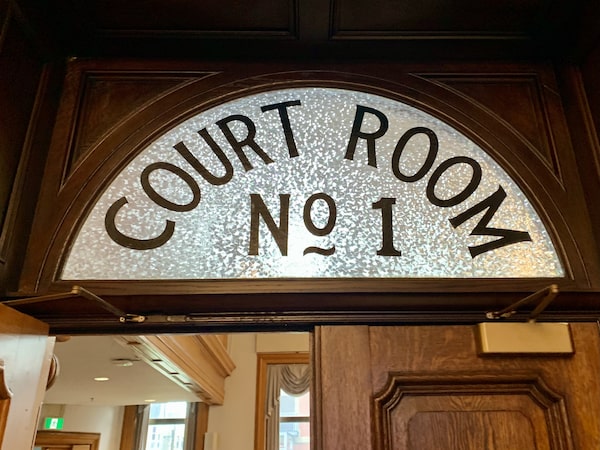
A courtroom shown at Newfoundland and Labrador Supreme Court in St.John's.Sarah Smellie/The Canadian Press
Though it serves just a fraction of Newfoundland and Labrador’s population, the courthouse in the central Labrador town of Happy Valley-Goose Bay is the second busiest in the province, after St. John’s.
Reams of names are on the daily docket for the two courtrooms in the small, beige building. There are already more than 60 appearances scheduled for the first two weeks of June – a fifth involving at least one charge of sexual assault.
Advocates who work with sexual assault victims in Labrador say there would be even more cases on the books if the region’s courts were better equipped. Police data indicates the rate of sexual assault in Labrador is more than four times the national average, and advocates say victims are overwhelmingly Indigenous.
But when cases are plagued with delays and lawyers are flown into remote Indigenous communities for hurried meetings minutes before victims take the stand, advocates say the court system does more harm than good.
“There’s reasons why people don’t call the police and one of the main ones there is such a long, drawn-out process of going through the courts,” Desiree Wolfrey, who runs the Kirkina House women’s shelter in Rigolet, N.L., said in a recent interview.
Jessica Keating, executive director of Libra House, a women’s shelter in Happy Valley-Goose Bay, says court delays put Labrador women in danger because the towns they live in are so small, especially along the north coast, where the largest community is Nain, with a population of about 1,200 people.
“Their offender, of course, is free and they see them regularly,” Keating said in a recent interview, “and they’re fearing for their life because they made this accusation.”
“I’ve seen cases actually being dropped because of the length, because it took so long to get to court,” she added.
Labrador is home to about five per cent of Newfoundland and Labrador’s population but the courts in Happy Valley-Goose Bay adjudicate about 10 per cent of the province’s cases. The town has a population of about 8,100 but logged 2,566 cases in the year ending March 31, 2018, according to the most recent data available.
The percentage of cases in Happy Valley-Goose Bay is high partly because judges and lawyers from that court regularly travel to communities along the north coast, setting up court in town halls, community centres and, in Natuashish, N.L., the local school.
By comparison, Corner Brook, N.L., located in western Newfoundland, posts similar case numbers but has a population of about 19,500 people.
In 2016, the Supreme Court of Canada issued what’s known as the “Jordan decision,” which imposed an 18-month limit between the time charges are laid on a defendant and the conclusion of provincial court proceedings without a preliminary inquiry. The time limit is 30 months in cases before federal courts.
Defendants whose cases run longer can apply to have them ended. There have been 39 so-called Jordan applications filed in the province since the rules came into play. Eight – about 20 per cent – were filed by defendants in Labrador. Three involved sexual assault and one involved sexual interference.
A spokeswoman from the province’s Justice Department says the frequency of Jordan applications in Newfoundland and Labrador has dropped since 2016, adding that only one defendant has been successful in having their case ended because proceedings took too long.
“The Department of Justice and Public Safety is aware that the justice system in Labrador can present challenges,” Danielle Barron said in a recent email. Construction is underway for a new courthouse in Happy Valley-Goose Bay and it should open this fall, she said.
Retired lawyer Dennis Mackay, who worked with the legal aid office in Labrador from 2006 to 2011, says many of the problems with the region’s court system go beyond the Happy Valley-Goose Bay courthouse.
The court setup for coastal Labrador “would never be tolerated” in St. John’s, he said in a recent interview. Flights to small communities are weather dependent, he said, adding that when lawyers and judges arrive, they often have little time to meet with clients before proceedings begin for the day.
Sometimes, Mackay added, lawyers are forced to huddle with their clients in hallways for privacy. With many complex cases involving child protection or sexual assault, the resources dedicated to these cases are not adequate, he said.
“We never used the term ‘racism,’ but it’s getting pretty clear that kind of behaviour now would clearly be classified as a form of racism,” Mackay said. “(Labradorians are) being treated completely different than we would allow in St. John’s or Corner Brook or anyplace else.”
Bill English was a judge in Labrador from 2000 to 2014 and has since retired, though he’s back to practising law in St. John’s. He says Labrador’s overburdened court system comes from the same systemic problems as the region’s high rates of sexual assault: Labrador’s Indigenous populations face sweeping social inequalities, including poverty and crushing housing shortages, which have gone unsolved for too long.
“It has to be acknowledged that this is a major problem, and a real distinction between the way Indigenous people and the rest of the population is treated,” English said in a recent interview.
Bringing in outside judges and lawyers to communities with different cultures, languages and histories doesn’t make any sense and it isn’t helping people, he said.
“I don’t know if I’ll see it in my lifetime, but I would very much like to see an Indigenous justice system, or two or three of them, in Labrador.”
Our Morning Update and Evening Update newsletters are written by Globe editors, giving you a concise summary of the day’s most important headlines. Sign up today.